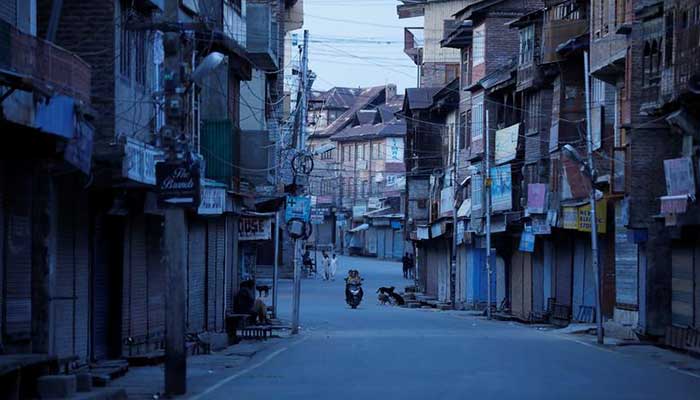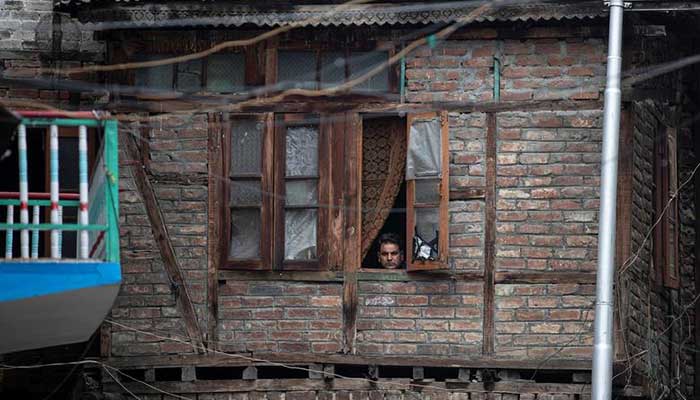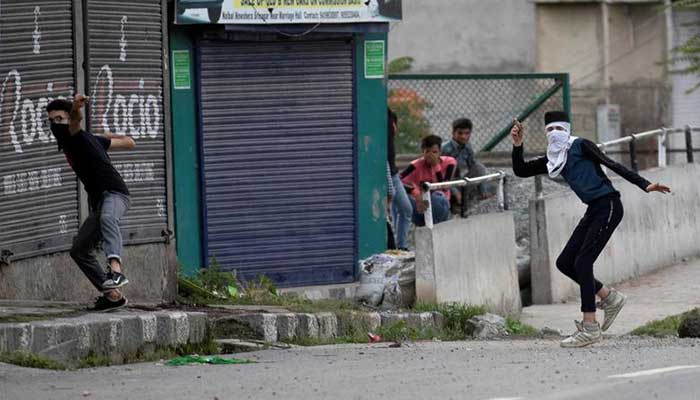Pakistan and the people of Kashmir, around the world, will mark ‘Youm-e-Istehsal’ as exactly one year ago today, on August 5, 2019, the Indian government illegally annexed occupied Kashmir into two union territories by revoking Article 370 of its constitution.
The main intent behind the move is to expose Indian atrocities and show solidarity with the people of occupied Kashmir. Today (Wednesday), Prime Minister Imran Khan is expected to visit Muzaffarabad to mark Youm-e-Istehsal.
Anti-India protests are planned throughout Pakistan, particularly in Azad Kashmir, while all major cities in Pakistan will hold solidarity marches, along with a one-minute silence.
CM Murad leads Youm-e-Istehsal rally at Sea View, Karachi
Chief Minister Sindh Syed Murad Ali Shah led a protest rally at Karachi’s Sea View against India’s unilateral move to bifurcate occupied Kashmir into two union territories.
“Shaheed Bhutto said that Pakistan will wage a war for thousand years but not forego its right on Kashmir,” he said. “India’s atrocities against Kashmiris is not hidden from anyone. New Delhi has imposed the longest curfew in the world there,” he added.
The chief minister said that Kashmiris have stated that they wanted to live and die by Pakistan. “Pakistanis have also decided that they will live and die beside their Kashmiri brethren,” he added.
He said that everyone was gathered today, voicing the same “Kashmir Banega Pakistan” slogan.
“Pakistan’s political parties are united on the issue of Kashmir,” he said. “Prime Minister Imran Khan is acting as the ambassador of Kashmir by ensuring their voice reaches the world.
The chief minster fired shots at the Indian Air Force’s decision to buy Rafale jets. “The more Rafale jets India buys, the more cups of tea we have ready for them,” he said, in reference to Pakistan shooting down Wing Commander Abhinandan’s MiG-21 Bison aircraft last year.
“The real power lies not with the aircraft but the one flying it,” he said.
India imposes two-day ‘full curfew’ in occupied Kashmir
Meanwhile, Indian officials announced a two-day “full curfew” on Monday citing intelligence reports of looming protests in the Muslim-majority region of seven million people, where locals have called for the anniversary to be marked as a “black day”.

Fearing a massive reaction from the Kashmiris, New Delhi imposed the curfew on Tuesday in occupied Kashmir, blocking main roads throughout the valley with barbed wires and steel barricades.
The Modi-led government revoked Article 370 last year on this day, promising economic prosperity and progress after more than three decades of violence that has seen thousands die in the disputed region.
The situation in the occupied territory remained tense as police cars patrolled Srinagar after dark on Monday and again on Tuesday morning, with officers using megaphones to order residents to remain indoors.
A “full curfew” means people can only move around with an official pass, usually reserved for essential services such as police and ambulances. The Himalayan region is already subject to restrictions to reduce the spread of the coronavirus, with most economic activities limited and public movement curtailed.
For locals, the new curfew brought back memories of the weeks-long clampdown a year ago. Then, a total communications blackout was imposed, with phone and internet access cut and tens of thousands of fresh troops moved into the valley — already one of the world´s most militarised regions.

Around 7,000 people were taken into custody — including three former chief ministers. Hundreds remain under house arrest or behind bars to this day, mostly without charge.
Modi’s revocation of Article 370, which has been accompanied by an upsurge in violence that is set to make 2020 the bloodiest year in a decade, has triggered major economic hardship exacerbated by the coronavirus pandemic.
Many locals are also angry that for the first time, people from outside Kashmir are being granted rights to buy land, fearing that India wants to change the region’s demographic makeup.
In a fresh setback to New Delhi’s stance on the issue, the Human Rights Watch condemned New Delhi and urged it to reverse its “abusive policies” in occupied Kashmir.
“Indian government claims that it was determined to improve Kashmiri lives ring hollow one year after the revocation of Jammu and Kashmir´s constitutional status,” Meenakshi Ganguly from Human Rights Watch had said in a statement Tuesday.
“The authorities instead have maintained stifling restraints on Kashmiris in violation of their basic rights.”
New political map of Pakistan including IoK approved by PM Imran
Prime Minister Imran Khan on Tuesday announced the approval a new political map of Pakistan, which included Indian-occupied Kashmir in its entirety.
The approval was given in a Cabinet meeting chaired by PM Imran earlier on Tuesday during which the participants were apprised of the latest situation in the occupied Muslim-majority region.

Speaking during a live televised address to the nation, the premier shared the details of the decisions made in the Cabinet meeting. “Today is the most important day in the history that we are presenting a new political map of Pakistan before the world,” he said.
“The cabinet has approved the map,” he said, adding that the Kashmiri and national leadership has also green-signalled it. The new map would now be used in school and colleges as well, he added.
The final status of “Indian Illegally Occupied Jammu and Kashmir” was to be decided in line with the relevant UNSC resolutions, read the map.
UN experts slam ‘alarming’ rights free-fall in IoK
A group of UN rights experts urged India to address the “alarming human rights situation” in Kashmir since it was stripped of its autonomy a year ago on Wednesday.
The independent experts, who do not speak for the United Nations but report their findings to it, called on other nations to pile the pressure on India if it does not do so.
“Urgent action is needed,” the 18 special rapporteurs and other experts said Tuesday in a joint statement.
“If India will not take any genuine and immediate steps to resolve the situation, meet their obligations to investigate historic and recent cases of human rights violations and prevent future violations, then the international community should step up.”
The experts urged New Delhi to schedule urgently visits by UN experts, particularly by those investigating torture and disappearances.










